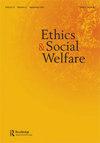Editorial
IF 0.9
Q4 SOCIAL WORK
引用次数: 0
Abstract
This third issue of the year comes after a very successful special issue (17: 02) on ethical issues in research in social welfare policy and practice. The present issue contains general papers that were not designed for a special theme, but each has useful discussions of aspects of social welfare and ethics relevant to the journal. It also contains a couple of particularly interesting practice papers, one by a philosopher reflecting on his own experience of involvement in social welfare practice. The global reach of the journal is illustrated by the provenance of papers in this issue, with contributors coming from Sweden, Finland, Australia, Zimbabwe, and Austria, as well as the United Kingdom. The editors continue to welcome contributions to the journal from disparate sources in the belief that readers will benefit from understanding how different people in different social contexts conceptualise ethical issues in social welfare. In the first paper in this issue William Bülow of Uppsala University, Sweden, asks the question: ‘Who is Responsible for Remedying the Harm Caused to Children of Prisoners?’ He points out that it is often a cause for great concern that the children of prisoners suffer considerable harm as a result of the loss of a parent – and all that this can mean in terms of financial problems and emotional stress, even when the offender has been a cause of distress before their incarceration. He treats it as a matter of social justice, discussing four general principles that he argues are relevant to a balanced understanding of the responsibilities involved for these disadvantaged children. His focus is on responsibilities that may be identified going forward rather than seeking to apportion blame for past actions that have given rise to the present harm. However there is no avoiding the principle that those who have caused a situation to develop must be part of those who may be identified as bearing responsibility for its amelioration. Bülow also considers who may innocently benefit from social injustice, and the importance of the capacity of various agents to make a difference for such children, as well as existing commitments that may be in place requiring attention and action. The paper offers a thoughtful example of applied philosophical argument to a very practical situation concerning the social welfare of a vulnerable group whose needs and precarious position demand ethical, social and political intervention by differently positioned individuals and groups. The second paper in this issue is another substantial piece of work by a group of four Australian academics from the Latrobe University and the Royal Melbourne Institute of Technology, and two specialist practitioners at the Independent Family Advocacy and Support, Victoria Legal Aid. The vexed relationship between parents, children and the state as represented by child protection social workers and related state agencies responsible for child health and welfare, is a long-standing issue of concern. The imbalances in power and responsibility are complex, but as the group of six authors contend, a commonly observed aspect of power relationships in social welfare is the service users’ experience of oppressive practice by individuals, agencies and the whole child protection system. Advocacy is not a novel idea in this area, but the authors have done a thorough job in bringing ideas of advocacy formed in legal practice to bear on the issues in child protection, whilst acknowledging the use of advocacy in other areas. The case study approach focuses on the experience of an agency编辑
今年的第三期是在一期非常成功的关于社会福利政策和实践研究中的伦理问题的特刊(17:02)之后发行的。本期包含的一般性论文不是为特定主题设计的,但每一篇都对与该杂志相关的社会福利和伦理方面进行了有益的讨论。它还包含了几篇特别有趣的实践论文,其中一篇是一位哲学家反思自己参与社会福利实践的经历。本期论文的出处说明了该杂志的全球影响力,撰稿人来自瑞典、芬兰、澳大利亚、津巴布韦、奥地利以及英国。编辑们继续欢迎来自不同来源的对该杂志的贡献,相信读者将从了解不同社会背景下不同的人如何将社会福利中的道德问题概念化中受益。在本期的第一篇论文中,瑞典乌普萨拉大学的William Bülow提出了一个问题:“谁负责弥补对囚犯儿童造成的伤害?”他指出,囚犯的子女因失去父母而遭受相当大的伤害,这通常是一个令人非常担忧的原因,而这一切可能意味着经济问题和情绪压力,即使罪犯在被监禁前一直是痛苦的原因。他将其视为一个社会正义问题,讨论了四项一般原则,他认为这些原则与平衡理解这些弱势儿童的责任有关。他的重点是未来可能确定的责任,而不是试图为过去造成当前伤害的行为承担责任。然而,不可避免的原则是,造成局势发展的人必须是那些可能被认定对局势改善负有责任的人的一部分。Bülow还考虑了谁可能无辜地从社会不公正中受益,各种行为者为这些儿童做出改变的能力的重要性,以及可能需要关注和采取行动的现有承诺。本文提供了一个深思熟虑的例子,将哲学论证应用于一个非常实际的情况,即弱势群体的社会福利,其需求和不稳定的地位需要不同地位的个人和群体进行道德、社会和政治干预。本期的第二篇论文是由来自拉特罗布大学和皇家墨尔本理工学院的四名澳大利亚学者以及维多利亚法律援助独立家庭倡导和支持中心的两名专业从业者撰写的另一篇重要论文。以儿童保护社会工作者和负责儿童健康和福利的相关国家机构为代表的父母、儿童和国家之间棘手的关系是一个长期存在的问题。权力和责任的失衡是复杂的,但正如六位作者所认为的那样,社会福利中权力关系的一个常见方面是服务使用者对个人、机构和整个儿童保护系统的压迫行为的体验。在这一领域,倡导并不是一个新颖的想法,但作者在将法律实践中形成的倡导理念与儿童保护问题联系起来方面做得很彻底,同时承认在其他领域也使用了倡导。案例研究方法侧重于机构的经验
本文章由计算机程序翻译,如有差异,请以英文原文为准。
求助全文
约1分钟内获得全文
求助全文
来源期刊

Ethics and Social Welfare
SOCIAL WORK-
CiteScore
1.60
自引率
20.00%
发文量
36
期刊介绍:
Ethics and Social Welfare publishes articles of a critical and reflective nature concerned with the ethical issues surrounding social welfare practice and policy. It has a particular focus on social work (including practice with individuals, families and small groups), social care, youth and community work and related professions. The aim of the journal is to encourage dialogue and debate across social, intercultural and international boundaries on the serious ethical issues relating to professional interventions into social life. Through this we hope to contribute towards deepening understandings and further ethical practice in the field of social welfare. The journal welcomes material in a variety of formats, including high quality peer-reviewed academic papers, reflections, debates and commentaries on policy and practice, book reviews and review articles. We actively encourage a diverse range of contributions from academic and field practitioners, voluntary workers, service users, carers and people bringing the perspectives of oppressed groups. Contributions might include reports on research studies on the influence of values and ethics in social welfare practice, education and organisational structures, theoretical papers discussing the evolution of social welfare values and ethics, linked to contemporary philosophical, social and ethical thought, accounts of ethical issues, problems and dilemmas in practice, and reflections on the ethics and values of policy and organisational development. The journal aims for the highest standards in its published material. All material submitted to the journal is subject to a process of assessment and evaluation through the Editors and through peer review.
 求助内容:
求助内容: 应助结果提醒方式:
应助结果提醒方式:


